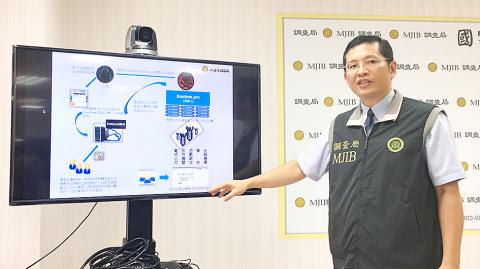A young man, surnamed Chung (鍾), has been identified as the alleged hacker behind a series of attacks on the Ministry of Justice’s Investigation Bureau, the Presidential Office, Chunghwa Telecom Co (中華電信) and the central bank, the bureau said yesterday.
Investigators believe Chung has launched distributed denial-of-service (DDoS) attacks and uploaded the videos of those attacks to YouTube, the bureau’s Taipei office said.
Chung’s motive is apparently to advertise his hacker-for-hire Web site, TDDoS.pw, which he set up with Poland-based hackers in February and has since attracted more than 2,000 members, the bureau said.

Photo: CNA
The Web site bills itself as the most powerful DDoS attack service provider in the nation, and performs cyberattacks and stress testing for users who pay with bitcoin, the bureau said.
On Monday, investigators questioned Chung at his residence and seized an unspecified number of devices, the bureau said.
Data extracted from his computer showed that Chung has carried out more than 20,000 attacks on networks worldwide, including government offices, online gambling firms and financial holding companies, the bureau said.
Since many of the attacks were staged as proof of ability, they tended to occur late at night and the duration was less than a minute, it said.
As a result, many institutions allegedly targeted by Chung were unaware that their network services had been disrupted, it added.
Five people are being investigated on suspicion that they hired Chung to carry out cyberattacks, it said.
The bureau urged government agencies and private companies to improve their protection against DDoS attacks.

PREPAREDNESS: Given the difficulty of importing ammunition during wartime, the Ministry of National Defense said it would prioritize ‘coproduction’ partnerships A newly formed unit of the Marine Corps tasked with land-based security operations has recently replaced its aging, domestically produced rifles with more advanced, US-made M4A1 rifles, a source said yesterday. The unnamed source familiar with the matter said the First Security Battalion of the Marine Corps’ Air Defense and Base Guard Group has replaced its older T65K2 rifles, which have been in service since the late 1980s, with the newly received M4A1s. The source did not say exactly when the upgrade took place or how many M4A1s were issued to the battalion. The confirmation came after Chinese-language media reported

A Ministry of Foreign Affairs official yesterday said that a delegation that visited China for an APEC meeting did not receive any kind of treatment that downgraded Taiwan’s sovereignty. Department of International Organizations Director-General Jonathan Sun (孫儉元) said that he and a group of ministry officials visited Shenzhen, China, to attend the APEC Informal Senior Officials’ Meeting last month. The trip went “smoothly and safely” for all Taiwanese delegates, as the Chinese side arranged the trip in accordance with long-standing practices, Sun said at the ministry’s weekly briefing. The Taiwanese group did not encounter any political suppression, he said. Sun made the remarks when

The Taiwanese passport ranked 33rd in a global listing of passports by convenience this month, rising three places from last month’s ranking, but matching its position in January last year. The Henley Passport Index, an international ranking of passports by the number of designations its holder can travel to without a visa, showed that the Taiwan passport enables holders to travel to 139 countries and territories without a visa. Singapore’s passport was ranked the most powerful with visa-free access to 192 destinations out of 227, according to the index published on Tuesday by UK-based migration investment consultancy firm Henley and Partners. Japan’s and

BROAD AGREEMENT: The two are nearing a trade deal to reduce Taiwan’s tariff to 15% and a commitment for TSMC to build five more fabs, a ‘New York Times’ report said Taiwan and the US have reached a broad consensus on a trade deal, the Executive Yuan’s Office of Trade Negotiations said yesterday, after a report said that Washington is set to reduce Taiwan’s tariff rate to 15 percent. The New York Times on Monday reported that the two nations are nearing a trade deal to reduce Taiwan’s tariff rate to 15 percent and commit Taiwan Semiconductor Manufacturing Co (TSMC, 台積電) to building at least five more facilities in the US. “The agreement, which has been under negotiation for months, is being legally scrubbed and could be announced this month,” the paper said,